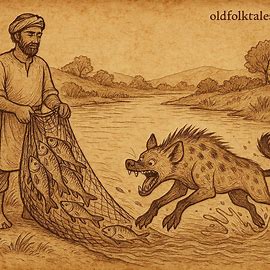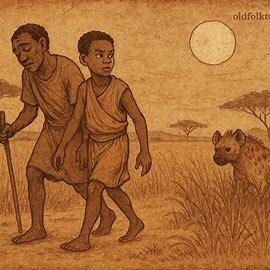Once upon a time, in a village where work and trade kept life turning, there lived a Blacksmith who prided himself on the strength of his hoes. With patient skill and the heat of his forge, he shaped the iron into sturdy tools meant to turn soil and harvest food. When his work was done, he said to himself, “I will take these hoes to sell. Perhaps today fortune will follow me.”
The Blacksmith gathered his hoes and set off. His journey brought him to a place where a great company of Blackbirds had gathered. Their feathers gleamed dark as night, their faces nearly indistinguishable from one another. The Blacksmith raised his voice: “Buy some hoes! Strong and sharp for your work.”
The Blackbirds fluttered, then answered: “Leave them with us. We will soon empty the hives and gather wax. Come to us in the third month, and we will pay you.” The Blacksmith, believing their words, handed over every hoe.
He returned home, satisfied he had made a fair trade. Days stretched into weeks, and the weeks turned into months. At last, the third month arrived, and the Blacksmith remembered: “This is the time the Blackbirds promised me my payment. I shall go to fetch my wax.”
ALSO READ: The Lions and Kimona-Ngombe: An Angolan Folktale
He walked back to the village of the birds. There they were, gathered as before, their feathers glistening black. He stepped forward: “Pay me now my wax!”
The Blackbirds tilted their heads and said: “To whom did you give your hoes?”
“Why, to you, yourselves!” he replied.
But the Blackbirds only laughed. “You cannot say ‘to us all.’ We are many, our feathers alike, our faces the same. Whoever took your hoes, name him. Was it Na Petele? Was it Na Lumingu? Tell us which among us you gave your tools, and he will repay you.”
The Blacksmith’s chest tightened with anger and despair. He could not name a single bird, for to him they all looked alike. At last, he cried out, “Then I will summon you before judgment!”
He went home heavy-hearted and spent the night restless. At dawn he rose, determined, and went to Lord Katete, chief among birds, to summon the Blackbirds. “They owe me my hoes,” he declared. “They refuse to pay.”
Katete listened gravely and sent messengers to call the Blackbirds. Soon the air darkened as the whole flock arrived, their numbers vast, their blackness overwhelming.
The Blacksmith stood before them and spoke: “I summoned you to pay me for my hoes.”
Na Katete turned to the flock. “Why do you not pay the Blacksmith?”
The Blackbirds bowed their heads and replied: “Master, we speak truth. The fibre is hammered, the baobab is peeled, but a man must still name the one to whom he gave his goods. Let Blacksmith show us which of us owes him, and that bird will pay. We have spoken.”
Katete frowned. “This case is hard to decide. Blacksmith, name the one.”
The Blacksmith could only repeat, “I gave them to the Blackbirds.”
But the flock cried out, “We are complete! Take out the one who owes you, and he shall pay.”
The Blacksmith faltered, unable to point to a single guilty bird. Katete shook his head. “I cannot decide this matter,” he said, and fell silent.
Just then, a Turtle-Dove alighted on the branches above. She cocked her head and asked: “What dispute troubles you so?”
The Blacksmith lifted his face and answered bitterly: “These Blackbirds owe me for my hoes, yet they deny the debt. I summoned them, but no judgment is given.”
The Blackbirds cried out in protest: “We owe him nothing!”
The Dove listened quietly, then said, “Wait. I will return with an answer.” With a soft flutter, she flew away.
Moments later, she came back, her wings bright against the sky. She perched again and spoke with calm authority: “Thou, Blacksmith, bind this one! Bind this one! Bind this one!” She pointed out birds one after another.
The Blacksmith obeyed, tying each as the Dove instructed. Suddenly, the bound birds confessed. One said, “I owe the hoes.” Another admitted, “I too.” Only a few protested: “Untie us, and we will catch the true debtor.”
At last, each of the guilty ones paid the wax they owed. The Blacksmith’s debt was settled, and his heart was light again.
From that day, people said: “When the Dove coos, she is judging the case of the Blacksmith.” For her song was not only a call of peace, but also a reminder of justice rightly given.
Moral Lesson
This tale reminds us that deceit, however clever, cannot stand forever. The Blackbirds believed their sameness would shield them, but truth found its way through the wisdom of the humble Dove. Justice often comes from unexpected places, and patience, persistence, and trust in fairness will triumph over lies.
Knowledge Check
Q1: Who was the main human character in the story?
A1: The Blacksmith, who forged hoes and traded them for promised wax.
Q2: What did the Blackbirds promise to pay the Blacksmith with?
A2: They promised to pay him with wax after emptying the hives.
Q3: Why could the Blacksmith not identify the debtor?
A3: All the Blackbirds looked alike, making it impossible to name one.
Q4: Who was called to judge the dispute before the Dove intervened?
A4: Lord Katete, the chief among birds.
Q5: How did the Turtle-Dove resolve the conflict?
A5: She instructed the Blacksmith to bind certain birds, leading them to confess.
Q6: What cultural lesson does this folktale teach?
A6: It teaches the value of truth, fairness, and humility, and warns against deceit.
Source: Kimbundu folktale, Angola.
Original text from Folktales of Angola (Heli Chatelain, 1894), Smithsonian Digital Library.







